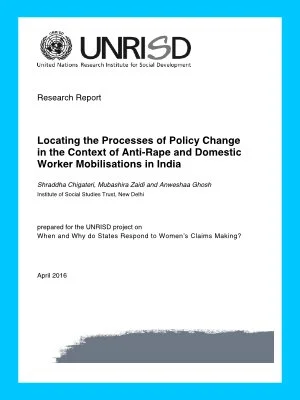By Shraddha Chigateri, Mubashira Zaidi and Anweshaa Ghosh
This research seeks to address the question of when and why the state in India responds to women’s claims making by foregrounding the mobilisations of women’s groups on two issues: anti-rape laws and domestic work. In particular, it analyses the relationship between women’s claims making and laws and policies, especially focusing on the issues around which mobilisations take place, the processes and strategies of claims making by women’s groups, and the processes through which the changes in laws and policies occur. The research addresses these concerns at both a national level, as well as two subnational levels, Gujarat and Karnataka. It also compares the differences and similarities in mobilisations, structural configurations, actors and coalitions between the two issue areas, and across the levels (national and subnational).
Institute of Social Studies Trust, New Delhi, April 2016, 226p.



